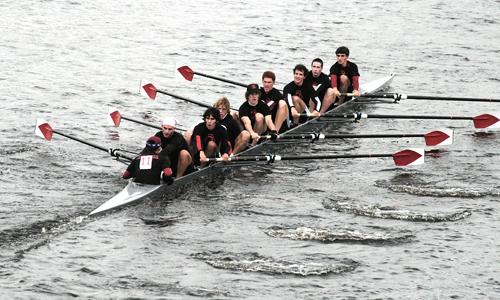
News
HMS Is Facing a Deficit. Under Trump, Some Fear It May Get Worse.

News
Cambridge Police Respond to Three Armed Robberies Over Holiday Weekend

News
What’s Next for Harvard’s Legacy of Slavery Initiative?

News
MassDOT Adds Unpopular Train Layover to Allston I-90 Project in Sudden Reversal

News
Denied Winter Campus Housing, International Students Scramble to Find Alternative Options
Picture Imperfect
While the lightweights take second in a photo finish, the heavyweights lose at IRAs for first time in four years.

It was a tale of two teams this past weekend in Camden, N.J.
While the Harvard varsity heavyweights relinquished their stranglehold on the Intercollegiate Rowing Association (IRA) National Championships, their lightweight counterparts took silver in a photo finish to end a season of struggle and turmoil on a positive note.
Meanwhile, the second varsity heavyweight crew and the varsity straight four boat both captured national titles, giving the Crimson two gold medals on the weekend.
HEAVYWEIGHTS
The last and best streak, at last, is over.
For three consecutive years, the Harvard varsity heavyweights had turned Camden, into a one-boat show, dominating IRA competition and modifying the record books with each triumphant row on championship Saturday.
For three consecutive years, the winner’s dock had room only for Crimson and gold, and every other boat was just scrambling for second place.
But a season that began with a snapped streak—Harvard lost its first dual race since 2002 in a nailbiter at Brown—ended with another, as the Crimson lost out on its chances at a fourth straight national title in Camden with a fourth-place finish on Saturday.
The victors? A California crew that surprised everyone, especially the heavily favored Princeton Tigers, who spent much of the last three years molding a boat to rival Harvard’s and was finally expected to come away with a national title this year.
California had its day in Camden, and Harvard’s historic run finally came to a close, but not until Harry Parker’s varsity eights of 2003, 2004, and 2005 had added a new wrinkle to the debate about the best collegiate varsity eight of all time.
“We can’t help but feel disappointed,” sophomore stroke George Kitovitz said. “Since Harvard had won the last three years, as much as the streak had to finally end, it’s just a shame to be a part of that.”
The Crimson managed to keep the race relatively close, preventing the other crews from building an insurmountable advantage.
“We haven’t been that fast out of the blocks, [so] we’ve been concentrating on trying to start fast early on, and I feel we did pretty well,” Kitovitz said. “We stayed with the other teams for most of the race; there weren’t more than three or four seconds between all the boats,”
Ultimately, however, while Harvard prevented its competitors from gaining too much of a lead early on, it was also unable to close the gap. California finished in 5:37.71, followed by Princeton, Brown, and finally the Crimson at 5:40.92.
The Harvard second varsity, however, thoroughly dominant in its dual season and fresh off its fourth Sprints title in five years, stayed true to course and won a national title in convincing fashion on Saturday. The Crimson finished with a time of 5:44.11, beating out Yale (5:47.79) and Wisconsin (5:52.21) to remain undefeated.
LIGHTWEIGHTS
It’s all about peaking at the right time, and after this weekend, no one knows it better than the Harvard lightweights.
The varsity eight put its fourth-place finish at Eastern Sprints behind it, adopting a more aggressive strategy to come within 0.076 seconds of taking home the national title.
Eastern Sprints champion Cornell won the gold medal with a time of 5:42.71, just edging the Crimson’s 5:42.79.
But despite the disappointment of barely missing out on first place, Harvard’s rowers were ecstatic about the crew’s turnaround.
“I’ve said all year, and all my life, that second place isn’t an accomplishment, but yesterday finally changed my perspective on things,” senior four-seat Wes Kauble said. “After all the turmoil we’ve been through, we were able to find nine guys who were dedicated to making this boat move, and it was fantastic to walk away knowing there was nothing more we could have done.”
Harvard started slow and was in fifth place after the first 300 meters. But the Crimson pushed aggressively and was able to take down each boat ahead of it until it was neck and neck with the Big Red.
As both boats crossed the finish line, there was little consensus as to who had won. Only ten minutes later, once the judges had examined a photograph of the finish, was Cornell declared the national champion.
“I thought we won the race, but that’s what a photo finish is for,” Kauble said. “It’s pretty tough to go from thinking that you had won to find out that you’re going home with a silver medal. But it was nice for us to find our speed there at the end—our boat refused to give up.”
Meanwhile, the varsity straight four took advantage of its lightness in a field packed with heavyweight crews to race to an open-water victory. With two-seat Dan Kettler calling the race, Harvard blew away the competition in its heat and streaked to a time of 6:23.35 in the Grand Final, 2.6 seconds better than second-place Wisconsin.
“Because the straight four is so light and so fast, you can take care of boats that are much bigger than you,” captain three-seat Dan Reid said. “We were just calm and collected, and we just kept pushing—it was a steady walkthrough.”
“It’s fantastic,” Kauble added. “It shows how deep our program is.”
—Staff writer Karan Lodha can be reached at klodha@fas.harvard.edu.
—Staff writer Daniel J. Rubin-Wills can be reached at drubin@fas.harvard.edu.
—Staff writer Aidan E. Tait contributed to the reporting of this story.
Want to keep up with breaking news? Subscribe to our email newsletter.
